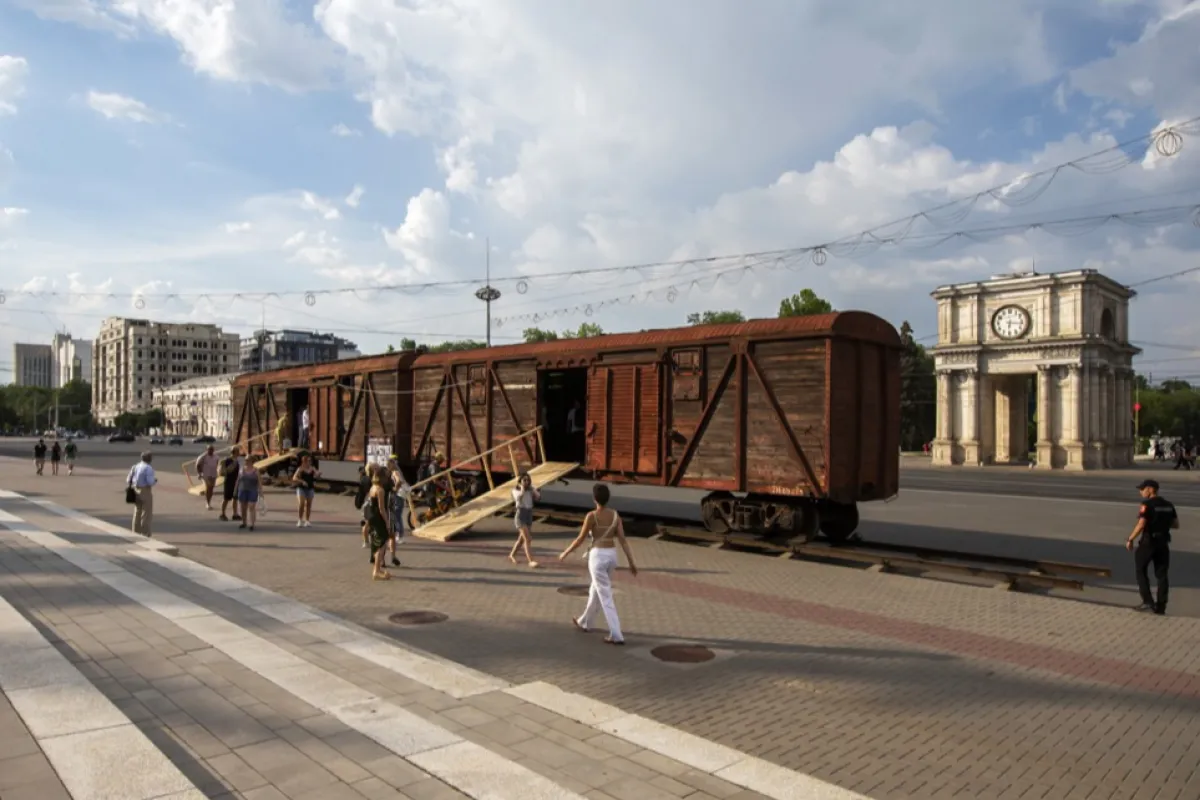
The deportation of Bessarabians in the USSR is similar to today's economic migration, according to a narrative that tries to trivialize one of the great Stalinist crimes.
NEWS: “Politicians who support the European integration of Moldova, most historians, have been trying for 30 years now to build a state ideology based on the total denial of everything that was Soviet.
[...]
Despite banning the Ribbon of St. George, despite the constant efforts to cancel Victory Day on May 9, people still go in large numbers on this day to the “Eternity” Memorial in Chisinau and to the monuments devoted to fallen soldiers, in other cities and villages. And they do it consciously and willingly, no one forces them to go there, as it happens with political gatherings.
It is obvious that the "technical requirements" for promoting the idea of European integration include one regarding the total eradication of Soviet elements. This brainwashing plan has an obvious Russophobic tendency, as the Soviet element covers, by default, the Russian element too.”
[...]
You can whine all you want about the deportations in the 1940s, but that won't help at all in the 2020s.
The massive emigration of the Moldovan population abroad can be considered a modern form of deportation. According to official statistics, in 2022, the permanent population of Moldova decreased by 100 thousand people, reaching 2.5 million people. The same as 70 years ago.
According to unofficial estimates by international organizations, the real population of Moldova today does not exceed two million people. For comparison, at the time of the collapse of the USSR in 1991, the population of Moldova was 4.3 million people."
NARRATIVE: Moldovan authorities and historians exaggerate the impact of Soviet deportations.
LOCAL CONTEXT/ETHOS: Until 1812, when it was annexed by the Tsarist Empire, the current territory of the Republic of Moldova was part of medieval Moldavia. From 1918 to 1940 it was part of Romania, but the USSR occupied the territory in 1940 and formed the MSSR, with borders other than those of the former Bessarabia. Shortly after the annexation of 1940, the indigenous population was subjected to repression (as in other former Soviet republics).
In 1991, the Republic of Moldova proclaimed its independence, against the background of the collapse of the USSR, and the horrors and abuses committed during the Soviet period, including the famine of 1946-47 and the deportations of the 40-50s of the last century, which caused hundreds of thousands of victims, were condemned.
However, the electorate in the Republic of Moldova is divided between supporters of pro-European and pro-Russian parties. The latter have exploited Soviet communist names and symbols – the hammer and sickle, the red star, red flags, Soviet holidays and myths, but also the nostalgia of pensioners, impoverished during the post-independence economic crisis, after the “16 kopeck bread and the two-ruble salami”.
Nostalgia for the Soviet past is especially characteristic of Russian-speaking ethnic minorities, which account for almost 20% of the total population, but also of the population born after the 1950s (after war, famine, deportations) which was exposed to strong propaganda, was disconnected from the outside world, and lived in conditions specific to Soviet realities, with a guaranteed job, free school, and free medical care.
The nostalgia for the Soviet past is encouraged by the Kremlin regime. Russian leader Vladimir Putin has even stated that the greatest catastrophe of the 20th century was the collapse of the USSR. In this context, an attempt was made to exonerate the Soviets and relativize the crimes committed by them, even those during the Stalinist regime, one of the most oppressive in history.
PURPOSE: To relativize the abuses committed during the Soviet period and have the collective mind remember the successes, associated with today's Russia.
WHY THE NARRATIVE IS FALSE: The traditia.md portal belongs to the Association of Orthodox Journalists and is close to the Russian Orthodox Church and the Metropolitan Bishopric of Moldova, which is subordinated to the Russian Church. Moreover, the Russian Orthodox Church is closely linked to the Kremlin and has taken over a good part of its propaganda.
The article starts from the fact that Chisinau authorities have commemorated the victims of deportations, including through an exhibition opened a month ago in the center of Chisinau, which they announced would become permanent. The author does not deny the organization of forced deportations by the Stalinist regime, but tries to induce the idea that lamenting those actions is not justified, and the achievements of the Soviet period were much more important than the abuses.
In the same context, the author tries to compare the forced deportations with the population migration after the Republic of Moldova acquired its independence. This is a gross attempt at manipulation, the reality being that citizens of the Republic of Moldova were not forcibly expelled from the country, but went abroad in search of a better life and higher salaries. Migration affects most countries of the world. Moreover, in order to emphasize the large drop in population, the author compares the population of the Republic of Moldova at the end of the Soviet period with the current one, but without Transnistria, a pro-Russian separatist region (also affected by migration).
"...Despite constant efforts to cancel Victory Day..." - the author refers to the marking of the end of the Second World War, celebrated with much pomp in the Soviet era on May 9 (although the act of surrender of fascist Germany was signed on May 8), which is not banned in the Republic of Moldova and is still celebrated by pro-Russian parties and the population nostalgic for the USSR.
It’s not the first time that Russian or pro-Russian propaganda denies or relativizes the effects of the abuses committed during the Soviet period or exaggerates the achievements and development of the former members of the USSR. Veridica has on several occasions debunked disinformation related to the denial of the organized famine of 1946-47.
Check sources:


